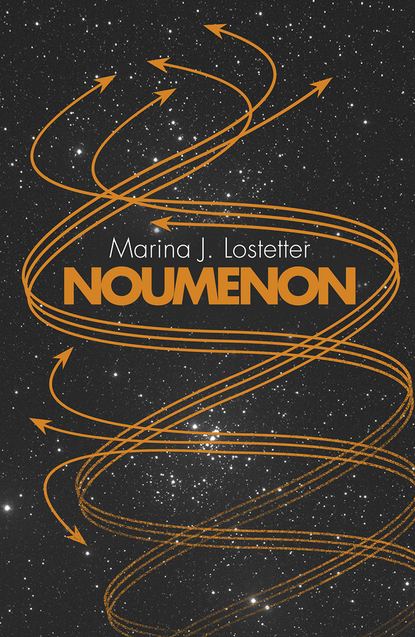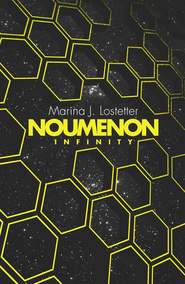По всем вопросам обращайтесь на: info@litportal.ru
(©) 2003-2024.
✖
Noumenon
Настройки чтения
Размер шрифта
Высота строк
Поля
The monitor embedded in the center of my bookcase turned on, displaying a shot of the Moon.
Grimacing despite myself, I waited for some violent indication that the ship had gone sub. I don’t know what I expected—more rattling, perhaps feeling pulled or squished like putty. Something extreme to indicate that I was messing about in pieces of reality I didn’t normally mess about in.
I closed my eyes again, afraid that if I didn’t they might pop out of my skull.
But then the light on the other side of my eyelids turned soft once more and lost its purple hue. A mellow chime of success came through the comms system. I opened one eye. Everything looked normal. Nothing distorted, no melting clocks or wiggling walls. Nothing changed strange colors or lost its density. It all appeared unaffected.
And then we were in! The view through my porthole had turned a starless, inky black.
The monitor replayed our transition—the thirty seconds before the dive through the thirty seconds after. And, oh—the Moon! It was there while simultaneously not being there. It flickered once, jumping a distance of millions of miles in a moment, then it came back (though, of course, we had jumped in time, not it through space). Instead of seamlessly floating by, it shifted more like a time-lapsed photograph—one frame blended into the other.
It had a ghostly quality to it. Quite literally: if we had chosen to travel through the moon, we could have. That was one of the great discoveries about sub-d: the nature of these newly found partial dimensions was actually hidden in the greater dimensions. In picking apart time we could occupy the same space as other matter. Even though I understood that intellectually, I was still glad we’d opted for going around. My anxiety was already in high gear as it was.
I looked at the monitor once more, to find there was nothing there. All of the moon’s odd behavior had taken place in a few seconds, and then it winked out. Space went black, starless, and we were officially in our SD bubble. Visible light could not penetrate, sound could not penetrate, most radiation could not penetrate—the only way we could communicate outside of our bubble now was with SD information packets. And that in itself was no small task.
The feed to the screen repeated. They’d replay the dive over and over again for a while—because the effect was so stunning, or because it confirmed that our conversion was a success and we were all still alive, I wasn’t sure. Probably a bit of both.
I watched it a few more times before my chip phone, now entirely contained to our internal network, indicated I had a call.
“Yes?”
“It’s Nika.”
“Where are you?”
“Outside your door. Let me in.”
I was so enthralled with this new reality that I’d failed to notice the safety light above my door had turned from red to green. I could unbuckle and walk about.
“It has a buzzer, you know,” I said, getting up. “A doorbell.”
“How was I supposed to know you were in? I half expected you to be running up and down the halls by now.”
Skipping, I thought with a smile. “Did you see that transition?” I pressed a button and the door slid aside. “It was spectacular.”
Nika leaned casually against my doorjamb with her hands in her pockets, and gave me a funny look when I moved aside for her to enter. “Guess what?” she said, “The air here is breathable and everything.”
“What? Oh.” I still had the space suit on, helmet and all. She came in and helped me slip out of it.
When I and my party dress were free, Nika leaped onto my bed, bouncing a little as she looked out the window. “Trippy, huh?”
“No kidding.” I crawled up next to her and sat crisscrossed.
“So. Here we are.”
“Yep.” I nodded and bit my lip, watching the last of the moon fade from view. “Here we are.”
“You ready for it?” she asked.
“What?”
“This.” She gestured all around. “Our new lives.”
I shrugged. “I guess. The place—outer space—is new, but has that much really changed? I’m still a communications officer. I’ve been doing that for the past five years. You’re still a historian.”
“Archivist. I’m officially an archivist now. And diplomat.”
“Oh yeah?”
“Yep. When we bring all the info on LQ Pyx back, I’ll be the one to interface with all of Earth’s bigwigs.”
She hadn’t told me that before. “Wow. You’re our representative, then?”
“Only when we go back.” She lay flat on the bed, with her hands tucked behind her head. “Too bad I won’t really be there. But, hey, I like being an archivist just as well. It’s easy, it’s fun. I mean, how lucky are we? To get handed our dream jobs from the get-go?”
I knew exactly what she meant. “I get to send the first crew report in five days.”
“Exciting. How many days is that for them?”
“About … forty-eight and a half. Give or take a few hours.”
“Oh, right.” She was quiet for a long minute.
“What are you doing?”
“Calculating how much time goes by for Earth each minute.”
“Nerd.”
“We’re all nerds,” she said, smiling. She shook her head. “Anyway. They’re setting up a great party down in the mess hall. Everyone’s shuttling over from the other ships. I came to get you.” She sat up and punched me lightly on the arm. “Better take good notes. You’ll want to detail every moment in your letter back home.”
We left the room and headed down the hall, still chatting about our jobs. “Do you know who you’ll be exchanging notes with?” Nika asked.
“Oh, you mean my pen pal? Yeah, I did some training with him. Biterman, remember? He taught me a special shorthand, since only so much info can be packed into one subdimensional signal package. Maximized my possible output. Obviously it’s not just him and me communicating, it’s all of us and all of them. We’re just the translators, in a way. There are plenty of other notetakers aboard—journalists. I’m just the one who has to compile everything.”
“Fun.”
“Oh, come on, you know it is, Ms. Archivist. We’ve got copies of millions of primary documents, and no one to stop us from accessing them. Your own personal historical playground.”
On Earth, people could only access rare documents under special circumstances. Not just the originals, but even the DNA-storage copies, since the tech to build and decode the molecules was still new and expensive. In order to read an artificial DNA strand and retrieve the encrypted information, you had to destroy it—which meant you better have the tech on hand to replace it. But we used nearly the same processes for cloning as we did for reading and replacing our databanks, so it was all there for us. Snap, nothing easier.
“We’ve got a wealth of information the average Earth layman can’t get ahold of,” Nika concluded.
And there was a reason for that. We might have old primary documents, history, but we’d be getting very little new information for the duration of the mission. We had no internet, no way to dial up an expert whenever we had an obscure question. If the information wasn’t coming with us, we likely weren’t going to have access to it—and even if I could ask mission control, we definitely weren’t getting a timely or detailed answer. Our only available communication method simply wouldn’t support it.
“We’ve got the information, plus,” Nika said with a grin, “we’ve got the brains to use it.”
“Going intellectual elitist on me already?” I winked at her. Of course she was an intellectual elitist. We all were. Nothing strokes the ego quite like being told from birth that you’ve been chosen for a fantastic mission because, frankly, your genes are better than everyone else’s.






